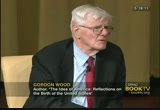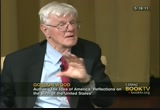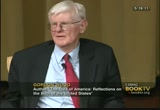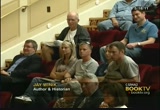tv Book TV CSPAN July 18, 2011 12:00am-1:00am EDT
12:00 am
12:01 am
12:02 am
the idea of the organization and washington is very sensitive to public opinion assuming there is any public opposition he backs away here is the promise they will not be hereditary of. but they are still a round. it is hereditary. they have a great library and it is innocuous but to their i's negative a real feeling that what the revolution is about marriage only should count and should be distinguished only because of merit, talent not
12:03 am
because of whom you marry that is a message of the revolution so they scare the bejeezus of a lot of people i see a real adams and there was a lot of opposition. it becomes more of a lobbyist group but washington has to promise they will not be hereditary. >> any more questions? >> what is the future of the american idea? i wish i knew. [laughter] nobody knows the future. >> if we do we get into trouble but we would have a better sense of what might not have been. we will not go off the rails
12:04 am
tomorrow china will not take off take over the world next year but what the future brings, nobody really knows. it will not have been quickly. the romans didn't know they were in decline. we don't know. >> just to remind you there will be a book can assign gain after words rican thylacine his following book and not so much the highbrow note that i don't know how many have seen in the book good will hunting but there is the famous scene in a bar where matt delaware men is trying to get a one been a she is taking a graduate student at harvard and he says you must be smart because you have been re
12:06 am
>> host: major jane blair your the first woman to write a book about your experience with respect to iraq. why? why would you want to write a book? >> guest: thank you for the question. i have a lot of reluctance about writing a book and being a marine there is a natural tendency to not a highlight my experience but to just be a marine and not get involved with right thing. but i did keep a journal with my time and there are some incredible stories nobody knows about. i almost felt it was an obligation to paint a portrait to highlight the
12:07 am
stories of the other marine said i served with you felt had done in such incredible things and thought i have to commit this to paper because the stories will not be told if i don't. >> host: that is interesting because men and women going to war they discuss what they cease go it is interesting to read hesitation kills to see the perspective of the zero men and the perspective of being in the military and the whole aspect of four that i am targeting someone to be killed. i am sure there was some hesitation like your colleagues because my brother was a marine they are pretty tight lipped and together and entrenched and there is a wall of silence. how did they treat you when you told them?
12:08 am
>> it was very encouraging because i was the unofficial role of being the historian. everybody knew i was documenting. because my unit was one of the few unman end squadrons, not just a marine corps but throughout the operation, it was a unique of the things that we were doing in the first thing we had employed in drones with a cap the ability. -- capability but i have received a lot of praise from nine colleagues' a surprisingly. i thought they would be very critical but they're happy the story is told because of highlights say piece of history that a lot of people don't know exist. >> host: take us through this be tests women have
12:09 am
been in all of the major wars people non jessica lynch as the first pow will then take an indirect. go back to a will issue now 15 years my entire service of the congress the arm services committee, if i have been watching to see how the role of the lawmen is in within the military ranks. let's go back to something that is very important. you push the envelope and women being involved and the combat. talk about what does combat mean? some people think they should not be involved.
12:10 am
>> guest: combat it is interesting because at some think the you earn the combat rid been or half to be infantry but stepping back if you look at the definition, it is any offensive action against foreign forces that results in some kind of conflict. with that didn't -- definition in mind we have no front line with the current conflict and iraq and afghanistan and people would not be in these combat roles to find themselves on the front line to support units that have females floor and traditional roles that people did not sign of to be in the infantry. >> traditionally we felt combat was infantry unit now we find it jessica lynn two
12:11 am
was supply person on the convoy in pfizer self -- finds itself in a firefight that i want to go back to that but it use the someone like ruby where the bomber got the front line going into the cafeteria she was one of the people blown up. the reality is i would say that is the front line. >> guest: surprisingly women are off to it -- often under acknowledge because there are no combat roles for women. whether because of current policy or because women are suddenly finding they are put in that place but it there is a role for women in this capacity that the
12:12 am
policy makers are useful such as being at translators are serving and civil affairs and help gain the indigenous women and children to communicate with them. >> host: when we go into afghanistan may go to the villages to win the hearts and minds of the afghan people and find they are more effective going into the villages to talk to them to get good information where the taliban is in what it means to get more cohesive to stand on their own so we can get out of afghanistan as well. >> women on are bringing a new dynamic to the front line.
12:13 am
the way that we conduct warfare is constantly involved -- devolving. longer first-generation and type of maneuvers that required total upper body strength and hiking 4 miles and doing hand combat. that is very important right now on the battlefield, forces are finding themselves not only with infantry but also diplomat and peacemaker there is a necessity to have the role of discussing to find out ways to have conflict resolution with the birth -- what ever we have it. >> host: also the upper body strength is important but we do find women have better endurance on average can run or into were
12:14 am
more -- and two were more. evade different sets of skills that requires both sets to be the most effective military that we have. how do the guys feel having women in the overall? you have some very interesting snippets about for example, one of the the tenants who really did not appreciate you being around 212 points. there are growing pains. it is not just boot camp then you are a marine. it takes awhile to understand what it is. it could take years. many times in the
12:15 am
exemplar, sometimes it takes a long time but others it takes years but then what it means. >> because of bad to i grew up in a non-traditional military environment, so there was growing pains to think like a marine to just follow orders and to do with the. in my new unit, is also what you must go through or year member of your unit's and prove yourself before your excepted. there was a lot of that going on. that happen so most any job. you have to feel your way
12:16 am
around. who really works, who is the ago two-person? who is always angry about anything? you know, what is going on in the unit that i would assume if you depend on these people to keep you alive? >> guest: absolutely brett the different with a civilian job is surrendering my sense of personnel or identity in terms of what we've were not marine like whether feminine are things that were not considered within regulation like nail polish or make up you have to surrender because but you have to not make excuses are have any kind of behavior that is different from what is expected. by surrendering that after
12:17 am
awhile i think what became trivial, people accepted me as a marine corps looking at me lead talking to me when you were in iraq and surprise that men were looking at the women. [laughter] had used that was accepted win one of your superiors said hello? you are a woman. they have been stuck his here. >> guest: you cannot become your cookie cutter. i am a female so they will always see me as a female. >> host: did that hinder you? you really think they said this is a marine or at least
12:18 am
initially it is a woman? >> not and who they gained your trust, maybe but now here is my partner and she is a woman? there is something that goes on one another marine gets to know and you. initially people aren't like i don't know what to expect. will she ask for special favors or expect me to helper? but once the proof you will do the job, people except to and maybe takes them little bit to start thinking of view and remember can add this -- candid discussions with fellow lieutenants that said i forget you are a female sometimes when
12:19 am
discussing taboo topics then to say i should not say that in front of you. i am one of the marines. >> host: with any good rating, i will tell you, this is superb rating, enjoyed reading this. several stories. you talk about the unmanned aerial vehicle they are in charge of basically say may now but it is not traditional at the beginning of the iraq war, with the unmanned vehicles over the area of the battlefield to figure out what is going on ahead of our overhead and we see the engagement of troops but then to get that
12:20 am
information and back to the person on the ground to be ready to shoot or to many troops and hide someplace? nothing. [laughter] >> that is come back? you see the big picture. we use it more in the future but you are on the cutting edge of doing that. also, you did not know if you were going to see your purchase paper you trained for this sander there, but fell whole thing what do we do with the women in our unit? >> talk about that. it is the theme going through the book. >> guest: i joined the marine corps during
12:21 am
peacetime to the understanding i would never really go to combat from the recruiters you will take the oath that honestly you will be sent to the work unit. >> but i took that seriously thinking if i do have to go to combat, i will do my duty. so in november 20,002,000,000 it started to come up with the idea we would go to iraq. my commanding officer pulls the two female officers and says look, by order of congress you are not allowed to go with us to combat because we will push ahead of the infantry and doing untraditional operations putting us ahead of a ground forces. i will fight to get you to
12:22 am
kuwait i have told headquarters of the 13 that are going the unit will not be effective without these females because we represented not only the collections portions but when was a pilot. we had with every section of communication, without them we would be a skeleton crew. my commanding officer said i will plush for it the best i can end get you to kuwait. but we are all going fairer. we get there and they for get about us. [laughter] >> fluor is about to take off and they all have people to replace us. i am guessing they realize they had to the best in
12:23 am
place we would not be effective. as a result, when we got the order, we were ready to go then it dawned on me that i guess i am going to iraq. i was actually have the because i wanted to stay with the unit and do the mission and all the males were expected and excited and we were glad we were forgotten about. >> host: that was a crazy time because we've had a load of we would go to iraq are not that happen to in october. so then we were sitting around and of course, we launched in march.
12:24 am
you find yourself in iraq? tell us what that felt like. did you have your gun with you all the time? wake up with adrenalin running? that second story is but you are in a two-way did he is and i iraq or first five-- vice versa so talk to us about the day you did get to see him. >> guest: there is two stories. there is a love story because my husband and i got married right before we went to our brac. >> host: you wanted a big wedding and everything. >> guest: may 2003 which was not a good date after all. we ended up postponing everything and his unit launched ahead of mine in deployed early january.
12:25 am
we had gotten married two weeks before and we did not know how we would communicate because i had his address but he would not have my address and he could not get letters to me. we had no way to communicate the last few months so there was the expectation and maybe i will see him out there somehow but some tetany informally it is. or that his but i didn't hear anything about the unit because there was no way to know what was going on with the union at -- unit at all. at the same time i was trying to grapple with the feelings i am the newly wed and imus my has been i have
12:26 am
a mission to do i have to focus on what i am doing. it was hard at that point* be newly married rewritten i felt what happen if i am killed and i don't get to know my has been battle? >> host: that happen to a lot of people. >> imagine world war ii of those couples that got married to the day that we just passed this about 10 days ago, the anniversary of there was a lot of that going on in. released today we have something other than snail mail with email, phone, better chance is to communicate. what happened on the day you saw your husband and iraq? >> before we kicked off
12:27 am
going into iraq. >> host: both of you were in to wait a ceramic i had the privilege of my eighth job going to the meetings are his unit was located but platt ihop the units are off doing an exercise we fail to meet my left and now stands at zero psychopaths my mailing address a wild ride the ridiculous slater's s.a. unit to unit mail so they would not cut off routed back to the united states. but we found that so it would take a month instead of two weeks. we saw each other and it was great because i feel very privileged to have that opportunity to see him but it is hard to describe it as
12:28 am
romantic. [laughter] >> host: i started to laugh when you describe that. >> guest: my has been took one of the hon the end we drove to the front lines of kuwait and just looked out into the desert realized the absurdity of the situation sitting there looking over into iraq in what would be in front of us knowing we would soon cross the threshold into iraq. bits was interesting and like something out of a movie. very surreal. >> host: when you're has been to left first coming you were at 29 palms and don't give that a very good rating by the way. i am from california. [laughter] that is about an hour in a half east of less but you
12:29 am
are not very nice to california but that is where we can put everybody out there they can train in more like circumstances of iraq or afghanistan. you are living out there and you just got married in bought a house and your husband leaves you a letter to say if i die open this up. i will not say what that said. they should read the book but did you ever open the letter? >> not until iraq but i felt like opening at many times but i kept it because i once did to have something to look forward to if i needed it so as a less days last type of resort it is the bedrock holding me so it was
12:30 am
12:31 am
there's a certain level of assistance that you feel of their life down there but i'm not looking at them in the eyes staring at them face-to-face, so at the same time you feel like you can see the big picture okay i know that unit is about to call for fire with their artillery on her forces on the marines coming down the road. so it's my job to protect them. so i felt very much throughout the war and in iraq that my job was a protector of the forces. >> host: back to the title of the book, his attention kills, if you see something in you know you're either going to order the
12:32 am
kill or they are going to order the kill on your people. >> guest: exactly. you have a moment to decide this and you have to think before and what am i going to do in this situation? you don't have time on the battlefield to discuss those issues or grapple with them. you need to think about this before and with them exactly what you're printed and executed, because you only have moments and times and it the risk of someone else's life or greater casualties or risk putting your own unit at risk as well. >> host: talk about the date that you were going to go out on the road. you were going to go up to an area there was a lot of activity, and that might have put you more on a mano a mano situation, and you did go up and heard the next day the fuel truck didn't come so you didn't go up and someone else did i had a few. how did you feel about that?
12:33 am
because they believe they did what you might have been doing. >> guest: that moment was probably - what my unit talks about the most as being the hardest moment. i talked to my commanding officer since then and we've kept in touch and my sergeant major and we talk about this particular moment a lot because had we gone through the area right when lynch was going through that critical area when there was unexpected amounts of forces fighting against our unit and basically our units became entrenched in the area and it turns out there were a lot more combat than they had expected. we were initially supposed to push through that area and go north to an area and launched our uav from that area so we could look as the ground forces came forward so we would be in advance of them and be able to see what the threats were. but we were hearing, strangely enough on the bbc radio, that
12:34 am
that area was being lit up and all we had -- >> host: lit up, what does that mean? [laughter] i know what that means but what does it mean for the viewers? >> guest: they were just being attacked by the iraqi forces. they were being met with armored units and very strong resistance and unexpected amounts of really iraqi armored unit forces in trench in that position. >> host: so you could have been there and instead what happened? >> guest: we were waiting in our vehicles require a certain fuel, so will before we were able to go forward we had to get the fuel but was aviation gap, so in order for us to fly the uav we sent our fuel truck which we thought was only going to take a half an hour or an hour to go back to where the tanks were. but we kept waiting and the truck never came. so we have in order to go
12:35 am
forward but we couldn't go anywhere without a fuel truck. >> host: jessica lynch and others when that day and of course we know what happened with her, and in the to industry with jessica lynch to you have anything on that? >> guest: we through the uav for the mission so we were flying over the hospital when they were doing to the rescue. we got to watch the whole thing through the lens of the uav, at least through the rooftop, and we also did a scout out beforehand, so we were flying over and azeri young looking for critical loads of indication -- >> host: that she might be there -- >> guest: exactly, to collaborate information we have heard. >> host: flexible even after we went after osama bin laden and in pakistan, we actually had heard he was there may be a couple years before, but you really have to fine-tune and continue to look for information that collaborates the story
12:36 am
people are telling you. so you have a high chance that in fact that does happen so that if you send troops in you are going after osama bin laden or you are going in to get jessica lynch. >> guest: as a part of the information we were to pull from the fly over in the city indicated that she was in the city, so we were a part of the collaborative effort, and actually i think that is one of the shining moments that there were a lot. they were able to look at this imagery and analyze and see things i couldn't understand how they were seeing that, but they did a phenomenal job and thanks to them they saved so many lives on both sides really it's a very great effort that led to just a huge success for the marines. >> host: you and i had other things in common.
12:37 am
your mother is puerto ricans in your part latina. do you know spanish? i don't even know if you do. >> guest: unfortunately not. a great and there is not on my mother. pos could you understand it at all? of course you know arabic. you know arabic because you spend some time in egypt, and i did also when i was younger so did the knowledge of other languages help you? >> guest: absolutely. after high school instead of away to college right away i traveled a of a year and a half, and it was during the gulf war i started out increase and to my parents unhappiness i went over to the middle east and lived in egypt and israel and jordan specifically during that time period so it was phenomenal in terms of the cultural knowledge that on the accumulated, but also the language skills, too
12:38 am
and i fell in love from a very early age partially due to study in history as a kid and looking through at all the arts and the egyptians in history. but, so my love of the middle east and study before my unit went to iraq i became this cultural expert and taught courses in the marines on the corporate behavior and just about the culture as a whole and part of that was also some arabic-language, and so a group of us started studying the language and so when i went to iraq i became the unit interrogator translator basically just the person who whenever we ran into an iraqi would talk to them. as it was extremely useful because on several occasions we were able to the escalating
12:39 am
violence that could have resulted if there wasn't someone who was able to talk to them and find out why they were there and what they were doing. >> host: how much time to spend an iraq? >> guest: infil deployment early on i don't know how many months it turned out certainly not the amount of time people are deeply today. people are going for a year and a half now. >> host: the marines are originally as i recall for six or nine months, depending on what mos they were doing for us there and the army, boots on the ground actually in iraq for that 15 months or so, but it's a long time to be in the war. tuck to be a little about i guess you discuss a little bit in here about being at war mccaul the time, every day, and then coming back to the united
12:40 am
states, and how you go from that situation to the escalating your body and mental state to be able to flash back into regular life in the united states. >> guest: i really feel for the soldiers, marines, service members who have a hard time adjusting because it is an adjustment. and when you are in that alpha mode kind of have to be alert to everything all the time, you develop a sort of mind set as a free aggressive mind-set looking for threats constantly around you. so when you go back to america you are stuck in that mind set, and it is really hard to go back but for me the crowds were hard. ra still have a phobia about the crowd and what not because in
12:41 am
iraq if there was a crowd, there was a likely problem of mabey something happening in that crowd. >> guest: you can have control in the crowd. you don't know what's happening. it could escalate into a mob state. if your mind trigger's back to you can i control the situation i'm in, do i know where all the threats are around me? and so even coming back right and there's still that mentality of okay, what's the situation around me. are there any threats? i still think that way a little bit. you are never completely out of that. >> host: this is a hard question to ask, not going to ask about you specifically that as a marine coming back, whether you are a woman or a man, you're not supposed to seek help, just three integrate. what you're finding more and more because we work with our healthy soldiers and the programs put in camp pendleton,
12:42 am
sometimes you need to go over and talk to somebody and figure out with how you come back in. d.c. the marines doing that now or do you see there's still feel i'm strong and nothing is wrong i'm going to be able to do this on my own? >> guest: i think people are starting to ask for hope and there is not that much of a sort of people are not looked at as being weak anymore for asking for help because it affects everyone differently. i've seen people try to get over post-traumatic stress disorder or just the trauma of being in a combat situation in different ways. everyone has different coping mechanisms. for me writing the book was freakin' karnack. -- covered. it felt quite a bit but i saw the marines dramatically effective from it and was saddened some people became very withdrawn and others turned to
12:43 am
drugs. some had a violent acts and it is unfortunate because i feel if people just reached out for help no one is going to look at them as being weak. there are great programs out there for people to take care of themselves now and i wish the marines and any service member would take advantage of those opportunities because life shouldn't be a burden. you shouldn't have to live with those memories of the time and think there's a constant threat towards you all the time. >> host: in the book you have several instances where unless they don't know that you're an officer or they don't get it that you are an officer in their superior, tell me about one of those instances, and how do you overcome that fact that early on
12:44 am
in the but you said something to the effect on of the marines said to you i never salute women? [laughter] >> guest: yeah. well, i looked very young and especially then i looked really young. >> host: you look very young by the week. [laughter] >> guest: back then even more so so it was strange. i remember when i was in the kuwait airport there was a very senior enlisted marines and he was struggling with his friends, side and came over to me and was like ma'am said, how old are you? dtca salles my ring and a new i had to be 22 or something. i was 29 at that time and i said i'm 29. he said you look like you're 16. he didn't say it in a - we come he was just surprised because i looked so young in uniform. >> host: but any instances where they were just downright not very nice?
12:45 am
there must be an instance where somebody mistreated you were you out ranked them. of course that's taboo in the military. you're always supposed to be out of the corner of your audit checking out things. >> guest: i think sometimes maybe not so much any more but people will try what they call if they can get away with not saluting. you go up to them and say i am an officer, try to respect and correct them and let them know i read a salute just like any other officer. there is a culture like that but it's a small minority, and those are not your good marines. they are just marines who -- >> host: -- for their
12:46 am
education benefit. don't understand the real importance of being in the core. >> guest: right. and it's not even a female-mail or officers, acting superior. it is of the military, and so part of that is a rendering a salute to officers. i never let anyone get away with it. [laughter] >> host: and beauvis do they wrestle with that you said one officer and you this to me right now? >> guest: no, i think throughout my time in the core i had a great leaders. one of the people i respect the most is colonel wallace. one of my first commanding officers, and i remember him in particular because when i was a young private first class st out of boot camp enlisted, she came to me, shook my hand and treated me like i was some important
12:47 am
officer, and i always remember from of my time going and looking at his leadership he treated everyone with such respect no matter what rank you were and i always try to follow the exceed all the time of being respectful and if there was something i saw all wrong in another marine i would correct them in a respectful way, not that would put them down and realize that everyone has faults and sometimes it is just a matter of correcting it and correcting it in a constructive way because i know correcting it in an on constructive way doesn't help anyone and people would respond to that and generally i would get a sari or apologize or something like that. >> host: there was another woman officer in your unit and she couldn't wait to get out. explain that. here you come and you are a new minted second lieutenant coming over excited and you don't have marine in your background but
12:48 am
you're patriotic and there's this thing about being in marine and you are excited to do your job and everything at the first day can't wait to get the heck out of here. what happens to her in that situation? and why, why such -- of was the difference in the way you found the core? >> guest: this operating factor you to decide whether to integrate and accept that marine like spirits and if you hold on to facets of your life that are not marine like, for example, a lovely person and everything, but she just didn't want that gung-ho type of lifestyle. she didn't want to be the buber tough female. it wasn't a part of her character. she didn't want to emulate that. so for her it seemed like a struggle to get accepted or just be accepted at face value,
12:49 am
whereas for me i was constantly pushing it like i commanded that sort of respect because for me it was important to be marine and important to do my job and support of the officer and the leader for the marines to this mission i felt was important. not that she didn't. she was very confident officer and everything but for her - she had enough. she just saw that it wasn't for her. she didn't want to aspire to that model. >> host: to another question i have, one of the unspoken lessons you learned is if you are not in charge of the bottom line of the company commodore not going to get to be a ceo. if you're in charge of human-resources, they are not going to consider to come if you are in charge of the manufacturing in making cars,
12:50 am
the bottom line you have a shot at being ceo. as of the marine, the number one dubious combat. here we are -- by the way the congress it's not the congressional law that was passed that says a woman can't be in combat. in 2005 we actually said the department of defense gets to decide that. it's the policy of the department of defense, and that is why when we were talking earlier about looking at the other nmos and things to be moved so the congress in 2005 initially in 73 the congress said no women in combat in these particular areas, but in 2005 we changed that and we said listen come to decide if you're going to change you have to come and tell us. really is the dod policy right now and so they are looking at.
12:51 am
but, you know, how do you -- so if you are a woman and you don't get to go to combat, even if you are already there like jessica lynch was, i would say like rupert was, like you were, one of the general said monday this is the reason why we are never going to have the three-star and four-star women who are generals because if you are not in church, or can't show that you are in combat when you move up the chain and are competing because you know it is in a cup or get out at some point with the officers. so if you can't show that in fact you have been a part of what the marines is about then they are going to get promoted for you. so what we do about that? how do you react to that? >> guest: it is a difficult issue because women are excluded from a lot of jobs in the military. i mean, the combat roles essentially, and that means
12:52 am
offensive ground operations units such as infantry, artillery, armored units, things like that. and increase of course a vacuum that women cannot reach a certain plateau and then it's hard to get promoted after that because can they can't get any of those other experiences. >> host: would you say we should let them? and what would be -- what we do it by saying we are going to put different standards for women who want to move forward on those? or first of all, would you allow the women to do that and brought in their ability to have the combat experience? and what kind of help or what kind of changes would you make so that you can ensure that some of the women can be in those ranks? >> guest: as you said the dod is looking at those issues right now and then you're going to be
12:53 am
able to assess the best way of thinking of the women can get integrated into the social but from the perspective i think the women are already sitting in some of those capabilities and are capable of meeting those missions in any front such as the female engagement teams or civil affairs. that there should be certain locations for the women in these slots. >> host: three story and four-star women? >> guest: absolutely but not have low during the fiscal standards. i think they should look for the different jobs and determined what is the standard necessary to do this job? not just women but i've also heard stories about an officer who gets a 100-pound guy who says we can't lift the 100-pound shell that weighs the same as in so now he can't do his job even though he is technically qualified to do the job. so it's not just women. actually, making a physical standards for each job would put
12:54 am
the most effective and right people in the job with their women or men. >> host: i've always said that not every man makes a good soldier. not every woman makes a good soldier but if a woman can meet the standards and she wants to dewitt, then why are we holding her back from trying? we are putting that artificial piece on it. out of all of the stories you told, there were several. when you're in iraq or kuwait, what was your knowledge or most difficult situation you can across? >> guest: well, there's so many. >> i don't want to give them all away. >> guest: the beginning i was
12:55 am
just learning to grapple with the idea when we were still in kuwait that is my unit was on kuwait, grabbling suddenly i was in combat even in to wait and so when the missiles started to get launched we thought they were coming right towards us because we would get the notice from the higher headquarters of the inbound and then we were trying to plot where it was going to land and so you really felt that sort of ayman, and there's like a gas alerts going off and everything and so that was hard, and especially because i had to control the mission at the same time in terms of looking at what the threat was coming and there were some very critical things we were doing at the time which is looking at the wheel well determining if there was any damage on behalf of the iraqi forces. because the was the indication we were going to launch a ground war max we had the mission of
12:56 am
keeping an eye out of the whole region. >> host: you write in the book the day you decide so you started. >> guest: i didn't, my marines did. i had this really savvy sar dream great at looking at the imagery and he said very matter of factly to me i think there's some damage on one of the wells, and i knew once we put out there something is going to happen, so i asked a are you sure that is what we are seeing, and he went back and was like i don't want to say that so we went back and looked at some mothers and sure enough we saw the deliberate damage where fires were being let off and the streams from the oil wells and gas explosions and things like that and so when we reported that back to the headquarters the immediately
12:57 am
came back and within five or ten minutes they said okay we are going to launch early so, at the moment -- >> host: here's a question. when i start on the armed services committee when i first got to congress one of three on the committee after the 53 members now of course i'm the senior third in line for the democrats, when we first started that, we would actually have a vote on an annual basis for the first two or three years to just get rid of the women in the military, and on that committee some democrats and republicans would vote to keep the women out. it wasn't until we brought the bill to the house floor that having more women and people we would put women back in the military. so, even 15 years ago people were saying women are just a problem in the military.
12:58 am
so, my question to you is do you think and how do you think the role of the women in iraq and afghanistan today, do you think that is changing the mind, maybe not of the american public because they don't see it so much, but the mind of our military leaders as they see women perform? >> guest: absolutely. i was surprised to see what the women were capable of. i have stereotypes' and expectations before i went into the military whether i was capable ordering it or not and i was surprised at the women's capability both in the camp and not i was capable of and other women were capable of and just seeing that on many occasions we could compete with the men. maybe we had a physical limitations that as a whole we were doing the same type of training that they were doing,
12:59 am
and that carried forward with to the military unit where we become the commission's the same way they would and go through the same exercises and training and everything, and i was always surprised by the women's capability, and not only that, but having served as a marine attache and working with foreign military is, i was surprised also at how positive five was received especially in the middle east, and that it was an unexpected thing for them when i was in jordan for example i was the first woman to serve in that capability but people were very receptive of it and he essentially the hesitation putting me in that role because they were not sure they were going to be respected of that. but it had opened the doors for me as to what women co
162 Views
IN COLLECTIONS
CSPAN2 Television Archive
Television Archive  Television Archive News Search Service
Television Archive News Search Service 
Uploaded by TV Archive on

 Live Music Archive
Live Music Archive Librivox Free Audio
Librivox Free Audio Metropolitan Museum
Metropolitan Museum Cleveland Museum of Art
Cleveland Museum of Art Internet Arcade
Internet Arcade Console Living Room
Console Living Room Open Library
Open Library American Libraries
American Libraries TV News
TV News Understanding 9/11
Understanding 9/11


























































